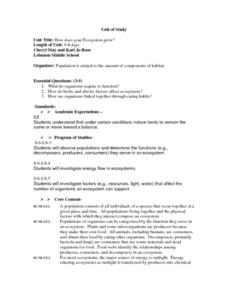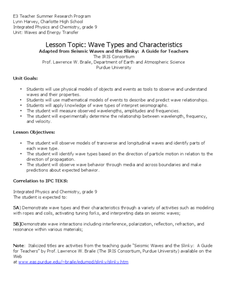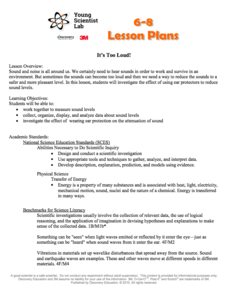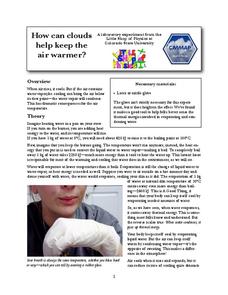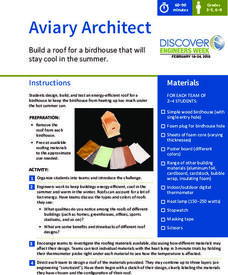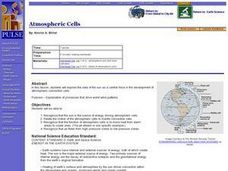Curated OER
How Does Your Ecosystem Grow?
Students consider that under certain conditions in nature tend to remain the same or move toward a balance. They observe populations and determine the functions (e.g., de-composers, producers, consumers) they serve in an ecosystem. They...
Curated OER
Fun With Food Chains
Students explore our ecosystem by researching animal eating habits. In this food chain lesson, students identify the links between predator and prey and the energy that passes between organisms based on what their diet consists of....
Curated OER
Mousetrap Cars
Use mousetrap cars to make hands on connections with concepts such as energy, friction, momentum, and simple machines.
Curated OER
Electromagnetic Spectrum
High schoolers define electromagnetic radiation, list major categories and uses of electromagnetic waves, identify potential health risks with electromagnetic waves, and demonstrate understanding of Plank's constant by solving...
Curated OER
The Tropopause
In this tropopause worksheet, students read about the temperature of the air in the tropopause or the layer of the atmosphere closest to the Earth. They answer four critical thinking questions about this layer and the energy changes that...
Curated OER
Virtual Earthquake
Students visit a website that features online interactive geology and biology simulations. They observe and estimate the amplitude of the largest wave and transfer the information to a nomogram. Based on the nomogram students will...
Curated OER
Science Word Search
In this science worksheet, learners locate and identify various vocabulary terms related to earth science. There are 44 words/phrases located in the puzzle.
Curated OER
Wave Types and Characteristics
Ninth graders identify the different parts of a wave. In this physics lesson, 9th graders observe wave behavior as it travels through a boundary. They determine the relationship between wavelength, frequency and velocity.
Discovery Education
It's Too Loud!
STEM scholars investigate sound attenuation by conducting an experiment in which they compare the farthest distance that they can hear a sound with and without ear protection.
Curated OER
Using Heat
The 6 slides give a few examples of ways that we use heat and heating systems. There is a diagram of circulation in a stove and forced air system as well as other examples of heat movers. Great for an introduction.
Colorado State University
How Can Clouds Keep the Air Warmer?
Condensing water warms the air around it. Young scholars consider this concept as they experiment with air temperature around evaporating and condensing water vapor. They simulate the formation of clouds to experience the associated...
Teach Engineering
Six Minutes of Terror
Help your class understand the design challenges when trying to land a remote spacecraft on a planet. Class members examine the provided information to understand how each component of a spacecraft is designed in order to safely land a...
Beyond Benign
What's In a Window?
Take a peek inside a window to heat efficiency. Scholars watch a demonstration to investigate how heat dissipates from several different cups of hot water. Scholars then relate the exchange to how heat escapes from the windows of a...
DiscoverE
Aviary Architect
Groups of two to four work collaboratively to engineer a birdhouse that will stay cool in the summer heat. Teams examine several different-colored roofs, testing the efficiency of each with a heat lamp. Then, groups sketch their ideas,...
PBS
Insulation Station
It's all about the material. Learners experiment with different substances as they try to keep an ice cube from melting. They draw conclusions by answering a set of questions about the types and amount of material that had the best result.
Curated OER
Atmospheric Cells
Students recognize that the sun is the source of energy driving atmosphere cells. They relate the motion of the atmospheric cells to mantle convection cells. Students recognize that the function of atmospheric cells is to move heat from...
Curated OER
redator and Prey- Food chain relationships
Pupils s identify the different trophic levels in the food chain and understand the importance of the energy cycle. They create a class food web using index cards and yarn and play a predator/prey game.
Curated OER
Food Chains and Food Webs
Students discuss the characteristics of producers, consumers and decomposers. Using a flow chart, they construct a food chain to visually show how organisms with different energy sources depend upon one another. Students explore a...
Curated OER
Food Web Follies
Seventh graders cut and paste animal pictures to create a food web and trace the path of energy. They write a paragraph explaining the importance of photosynthesis in all food webs.
Curated OER
My Habitat Address
Sixth graders draw a habitat and write about what they would need to survive in the habitat. They define the input of items such as materials, energy, and information, and what goes out of the habitat. They play a "Habitat Address" game,...
Curated OER
Physics- global warming
Young scholars discuss the concept of global warming and view a multimedia clip on the global warming phenomenon. They statistically analyze mean temperature data and compare a given set of data. Data on atmospheric CO2 is done then...
Curated OER
Efficiency
Fourth graders work cooperatively to investigate the efficiency of various household appliances. They share their findings in three to five minute oral presentations.
Curated OER
Warm Me Up!
Third graders explore and identify heat sources. They conduct an experiment involving thermometers and articles of clothing, and record and discuss the results.
Curated OER
Wind Turbine Kit
For this physics worksheet, students set up a wind turbine kit to identify what happens when it is assembled. They describe how energy is transferred within the circuit created and how many blades give the highest voltage.
Other popular searches
- Energy Transfer Diagrams
- Energy Transfer Ecosystem
- Heat Energy Transfer
- Transfer of Heat Energy
- Thermal Energy Transfer
- Types of Energy Transfer
- Transfer of Energy
- Transfer of Thermal Energy
- Energy Transfer Experiment
- Food Web Energy Transfer
- Energy Transfer Assessment
- Energy Transfer Wasted
